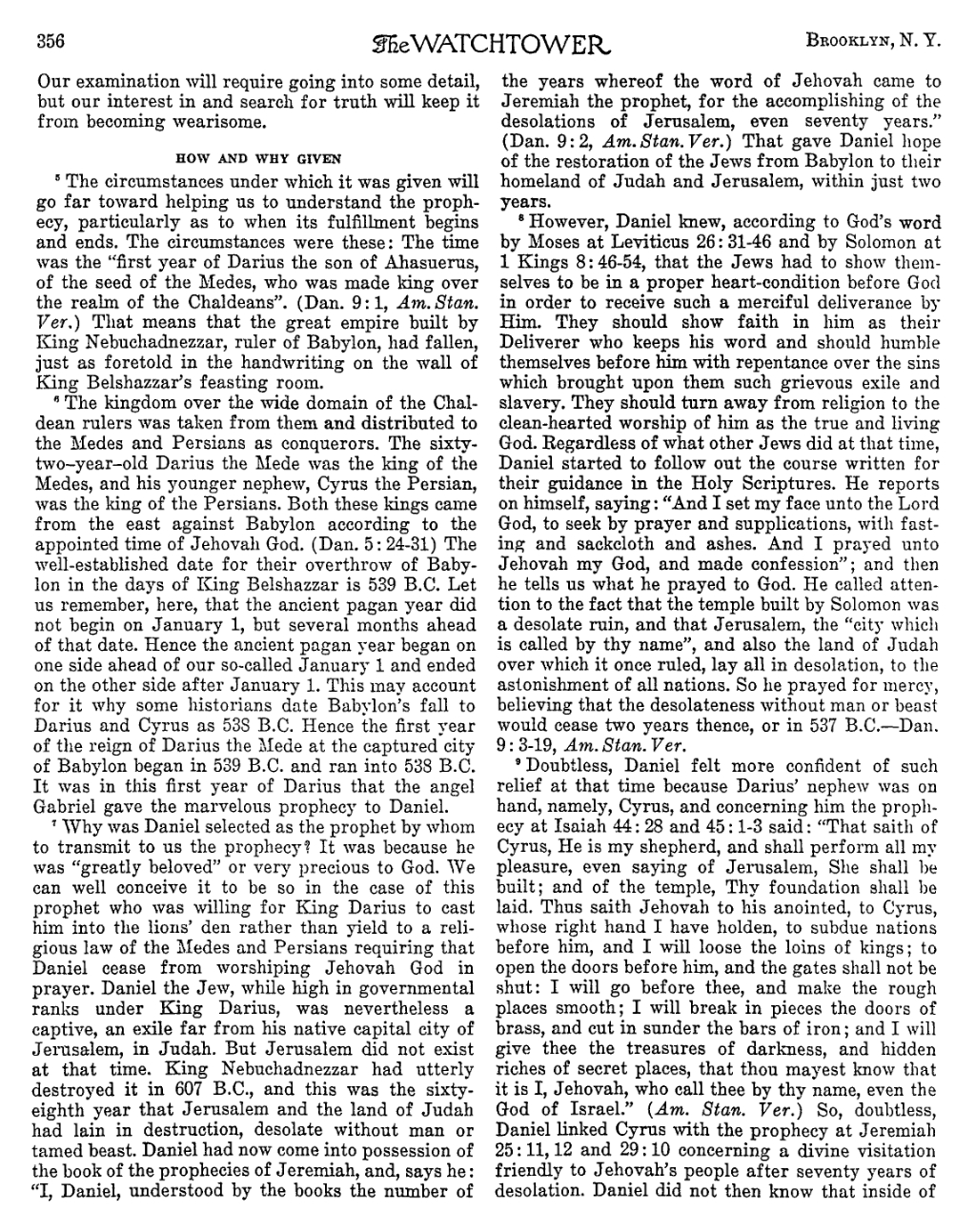This page has not been proofread
356
THE WATCHTOWER
BROOKLYN, N.Y
Our examination will require going into some detail, but our interest in and search for truth will keep it from becoming wearisome.
HOW AND WHY GIVEN
5 The circumstances under which it was given will go far toward helping us to understand the prophecy, particularly as to when its fulfillment begins and ends. The circumstances were these: The time was the "first year of Darius the son of Ahasuerus, of the seed of the Medes, who was made king over the realm of the Chaldeans". (Dan. 9:1, Am.Stan.Ver.) That means that the great empire built by King Nebuchadnezzar, ruler of Babylon, had fallen, just as foretold in the handwriting on the wall of King Belshazzar's feasting room.
6 The kingdom over the wide domain of the Chaldean rulers was taken from them and distributed to the Medes and Persians as conquerors. The sixty-two-year-old Darius the Mede was the king of the Medes, and his younger nephew, Cyrus the Persian, was the king of the Persians. Both these kings came from the east against Babylon according to the appointed time of Jehovah God. (Dan. 5:24-31) The well-established date for their overthrow of Babylon in the days of King Belshazzar is 539 B.C. Let us remember, here, that the ancient pagan year did not begin on January 1, but several months ahead of that date. Hence the ancient pagan year began on one side ahead of our so-called January 1 and ended on the other side after January 1. This may account for it why some historians date Babylon's fall to Darius and Cyrus as 538 B.C. Hence the first year of the reign of Darius the Mede at the captured city of Babylon began in 539 B.C. and ran into 538 B.C. It was in this first year of Darius that the angel Gabriel gave the marvelous prophecy to Daniel.
7 Why was Daniel selected as the prophet by whom to transmit to us the prophecy? It was because he was "greatly beloved" or very precious to God. We can well conceive it to be so in the case of this prophet who was willing for King Darius to cast him into the lions' den rather than yield to a religious law of the Medes and Persians requiring that Daniel cease from worshiping Jehovah God in prayer. Daniel the Jew, while high in governmental ranks under King Darius, was nevertheless a captive, an exile far from his native capital city of Jerusalem, in Judah. But Jerusalem did not exist at that time. King Nebuchadnezzar had utterly destroyed it in 607 B.C., and this was the sixty-eighth year that Jerusalem and the land of Judah had lain in destruction, desolate without man or tamed beast. Daniel had now come into possession of the book of the prophecies of Jeremiah, and, says he: "I, Daniel, understood by the books the number of the years whereof the word of Jehovah came to Jeremiah the prophet, for the accomplishing of the desolations of Jerusalem, even seventy years."(Dan. 9:2, Am.Stan.Ver.) That gave Daniel hope of the restoration of the Jews from Babylon to their homeland of Judah and Jerusalem, within just two years.
8 However, Daniel knew, according to God's word by Moses at Leviticus 26:31-46 and by Solomon at 1 Kings 8:46-54, that the Jews had to show themselves to be in a proper heart-condition before God in order to receive such a merciful deliverance by Him. They should show faith in him as their Deliverer who keeps his word and should humble themselves before him with repentance over the sins which brought upon them such grievous exile and slavery. They should turn away from religion to the clean-hearted worship of him as the true and living God. Regardless of what other Jews did at that time, Daniel started to follow out the course written for their guidance in the Holy Scriptures. He reports on himself, saying: "And I set my face unto the Lord God, to seek by prayer and supplications, with fasting and sackcloth and ashes. And I prayed unto Jehovah my God, and made confession"; and then he tells us what he prayed to God. He called attention to the fact that the temple built by Solomon was a desolate ruin, and that Jerusalem, the "city which is called by thy name", and also the land of Judah over which it once ruled, lay all in desolation, to the astonishment of all nations. So he prayed for mercy, believing that the desolateness without man or beast would cease two years thence, or in 537 B.C.—Dan. 9:3-19, Am.Stan.Ver.
9 Doubtless, Daniel felt more confident of such relief at that time because Darius' nephew was on hand, namely, Cyrus, and concerning him the prophecy at Isaiah 44:28 and 45:1-3 said: "That saith of Cyrus, He is my shepherd, and shall perform all my pleasure, even saying of Jerusalem, She shall be built; and of the temple, Thy foundation shall be laid. Thus saith Jehovah to his anointed, to Cyrus, whose right hand I have holden, to subdue nations before him, and I will loose the loins of kings; to open the doors before him, and the gates shall not be shut: I will go before thee, and make the rough places smooth; I will break in pieces the doors of brass, and cut in sunder the bars of iron; and I will give thee the treasures of darkness, and hidden riches of secret places, that thou mayest know that it is I, Jehovah, who call thee by thy name, even the God of Israel." (Am.Stan.Ver.) So, doubtless, Daniel linked Cyrus with the prophecy at Jeremiah 25:11,12 and 29:10 concerning a divine visitation friendly to Jehovah's people after seventy years of desolation. Daniel did not then know that inside of
